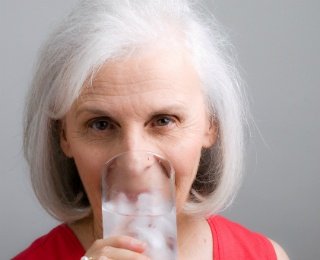Under the summer’s scorching sun, people become more concerned about dehydration, because we’re thirstier and sweat more. However, dehydration is a concern throughout the year. Dr. Ralph E. Holsworth warns that sweat can turn to water vapor when there’s little humidity, so it may be difficult to spot the signs of dehydration.
Seniors are More Likely to Become Dehydrated
No matter what the season, adults 50 and older are more likely to experience dehydration, and dehydration is more dangerous for older adults.
Seniors are more likely to experience dehydration in normal conditions because of:
- Swallowing disorders that may be caused by stroke, Parkinson’s disease or dementia
- Increasing age causing the body to be unable to hold as much water because of loss of muscle mass. By the age of 80, the body holds 15% less water than it did at 20.
- Kidney decline that prevents the kidneys from efficiently removing toxins from the blood, causing the body to expel water more quickly. The decline begins around age 50 and usually becomes significantly greater around age 70.
- Likelihood of having 5 or more chronic diseases
- Greater likelihood of taking 5 or more prescription medications, including diuretics, laxatives and blood pressure medicine, which may cause more frequent urination or perspiration
- Diminished intake due to fear of incontinence
- Reduced ability to feel thirst
- Illness that causes vomiting and/or diarrhea. Two separate studies indicated that up to 30% of people 65 and older who are hospitalized are dehydrated, and 48% of older adults admitted after emergency room treatment showed signs of dehydration.
- Reduced food intake, which usually results in less liquid intake
What Are the Signs of Dehydration?
It’s more difficult to determine signs of dehydration in older adults, because some of the symptoms—dry skin, dry and sticky mouth, constipation, confusion and irritability—may be caused by your or your parent’s medication or medical condition. And, as we all know in the case of our parents, seniors tend not to complain unless they are really in pain. Additional symptoms of dehydration include sunken eyes, unconsciousness or delirium, dark urine, infrequent urination, inability to sweat or produce tears, rapid heart rate, low blood pressure, and constipation. Take care to notice unusual symptoms and add them up. Even better, push fluids on your parent. And, yes, they’re not going to want to drink a lot if they’re out, especially if they’re not near a bathroom. The solution is to try to keep a bathroom nearby and purchase some incontinence products they can keep in their home and use at their leisure. No one has to know they’re using them.
Dehydration Is Dangerous
We tend to underestimate the effects of dehydration, believing that a glass of water will cure it. But dehydration can be life-threatening, especially for an older (or a very young person) or someone who is medically fragile.
Dehydration may cause:
- Heat injury, including heat cramps, heat exhaustion or heatstroke
- Urinary tract infections, kidney stones or kidney failure
- Seizures
- Low blood volume shock, which causes a drop-in blood pressure and in the amount of oxygen in the body and is life-threatening
6 Ways to Prevent Dehydration in an Older Adult
The key factor, of course, in preventing dehydration is increasing fluid intake. Experts recommend a minimum of 5 8-ounce glasses a day. That’s easier said than done. How do you persuade your parents to drink more? It’s probably almost as difficult for you to drink more.
- Always have water available. Keep a pitcher of water on their table or in their refrigerator and refill it frequently. Always carry bottled water with you.
- Discourage excessive intake of alcohol and caffeine, which have a diuretic effect. Be careful about sports drinks, because most of them contain sugar and sodium, which few people need unless they’ve been exercising intensely.
- Offer alternatives if they don’t like plain water, such as flavored water or juice (not advisable if they’re diabetic).
- Offer food with a high water content, such as celery, lettuce, grapes, watermelon, oranges, cucumbers, tomatoes, berries, beets, and soup. Salad anyone?
- Freeze it. Frozen sugarless or juice popsicles, frozen sugarless confections in cups, and even homemade frozen goodies may induce you and your parents to consume more liquid.
- Be a good example. Believe it or not, your parents are listening and watching you. When you drink more, they’ll drink more, and you’ll all benefit.

